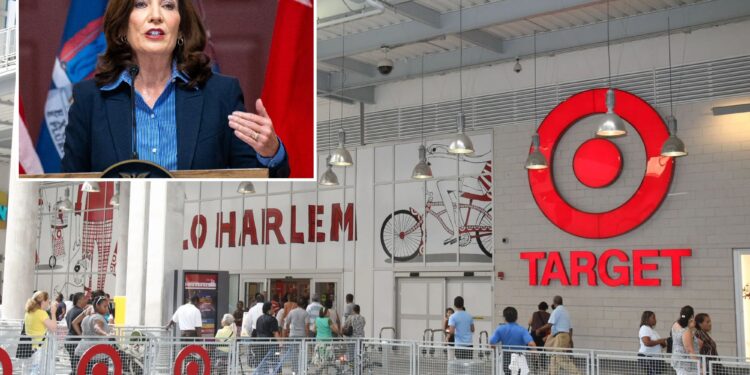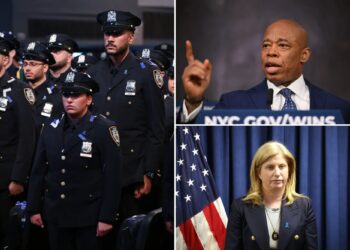
In a Bronx supermarket, a shoplifter grabbed the neck of the worker trying to keep him from leaving and threatened him with a knife.
Another grocer watched a repeat would-be thief burst into his store with a shotgun, sending customers ducking to the ground in fear.
In Long Island, one store has asked for a police car to be stationed around closing time to prevent last-second theft.
These incidents and precautions taken by stores are often unreported but still occur every day across New York.
And Tuesday, Target announced it’s closing one of its big stores in Harlem because of theft and safety threats to employees and shoppers.
Retailers and supermarkets brought countless examples like these to Albany last year.
We came to legislators with a simple ask: Please make our stores safer for our workers and customers.
We made the plea because for too long, our stores have been robbed and our workers and customers hurt in the process.
It’s simply unsustainable.
As state leaders plan their top priorities for the next session, they must make retail theft a key part of the agenda this time.
The stats show it continues to bedevil New York City.
In 2023 through the end of July, shoplifting arrests were up 19.9%, from 12,412 to 14,877.
These are crimes highly driven by recidivism: Of those 14,877 arrests, 64.5% had been arrested for shoplifting before 2023.
Just 386 people are responsible for 30% of shoplifting arrests — they’ve all been nabbed six or more times, with one having 55 arrests.
This crisis has played out with stark footage showing so many stores being robbed, workers confronted and customers scared.
The videos are a reminder that for supermarket and retail workers, days and nights can be unnecessarily dangerous.
We all know the drawbacks of retail theft.
There is the financial harm to retailers who lose profits — profits that are already narrower because of inflation and rising costs.
Stores also need to invest in their own security, which makes profit margins even tighter — a cost that at times the consumer has to bear.
At the same time, we’ve also all seen that the plague of retail theft has led stores to lock behind protective covering items that have been particularly appealing to thieves.
Stores don’t want to do this — it’s inefficient and an eyesore. But they have to because otherwise products like these might not stay on the shelves.
This year, retailers and supermarkets decided that enough was enough and formed Collective Action to Protect our Stores.
CAPS, as it’s known, is a coalition of more than 10,000 diverse businesses from across New York City and state to address retail theft head on.
The coalition grew over time, and when we went to Albany we had dozens of shops meeting with state legislators telling them their stories.
The asks the stores made were simple and straightforward:
- Create dedicated NYPD and district-attorney units for retail theft.
- Call on prosecutors to use harm on harm to request bail for repeat-theft offenders and judges to use this tool to set bail.
- Pass key legislation to raise assaults on retail employees and owners to a Class D felony, combine charges to upcharge theft and create a new offense of fostering the sale of stolen goods.
- Launch and run a public-service-announcement campaign against shoplifting and hold every level of the criminal-justice system accountable for doing its part to tackle this issue.
We were able to get part of the way. Legislation Assemblymember Manny De Los Santos and state Sen. Jessica Scarcella-Spanton introduced to elevate a retail-worker assault to the Class D felony of assault in the second degree gained significant traction with dozens of sponsors in the Assembly.
The measures, which put assaulting a retail worker at the same level as assaulting a cab driver or a transit worker, just make sense.
While we gained headway, the bills did not pass.
What we got was a retail-theft task force that Gov. Kathy Hochul has not signed into law.
We hope she does and that this task force will come together and realize this issue is not going away — too many stores continue to suffer retail theft, with workers in danger.
For many workers, these bills represent the best chance they have to feel safe and secure in their places of work.
During the pandemic, retail employees braved the unknown to keep New York City alive.
Today, all they ask is that their state government step up and give them the protections they earned when they were called “frontline” workers in 2020.
We urge Gov. Hochul to sign the task-force bill and the Assembly and Senate to make tackling retail theft a priority.
For the employees and customers at risk every day, there is no time to wait.
Seny Taveras is executive director of the National Supermarket Association.



























